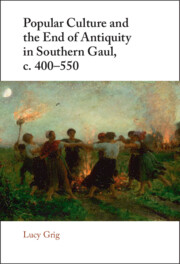Book contents
- Popular Culture and the End of Antiquity in Southern Gaul, c. 400–550
- Popular Culture and the End of Antiquity in Southern Gaul, c. 400–550
- Copyright page
- Contents
- Figures
- Maps
- Acknowledgements
- Abbreviations
- Maps
- Chapter 1 Introduction
- Chapter 2 Urban Contexts for Popular Culture in an Age of Transformation
- Chapter 3 Popular Culture, Society and Economy
- Chapter 4 Christianizing Popular Culture
- Chapter 5 An Alternative View
- Chapter 6 The Kalends of January
- Chapter 7 Conclusions
- References
- Index
Chapter 4 - Christianizing Popular Culture
The View ‘from the Pulpit’1
Published online by Cambridge University Press: 15 March 2024
- Popular Culture and the End of Antiquity in Southern Gaul, c. 400–550
- Popular Culture and the End of Antiquity in Southern Gaul, c. 400–550
- Copyright page
- Contents
- Figures
- Maps
- Acknowledgements
- Abbreviations
- Maps
- Chapter 1 Introduction
- Chapter 2 Urban Contexts for Popular Culture in an Age of Transformation
- Chapter 3 Popular Culture, Society and Economy
- Chapter 4 Christianizing Popular Culture
- Chapter 5 An Alternative View
- Chapter 6 The Kalends of January
- Chapter 7 Conclusions
- References
- Index
Summary
This chapter focuses on popular culture as seen by the late antique church, in particular as visible through the sermons of Caesarius of Arles. First the key features of Caesarius’ opus are introduced, along with the methodological problems it poses for scholars, including a close discussion of Serm. 1. Caesarius’ ideological programme is discussed, including his use of the concepts of rusticitas and imperitia. The bishop’s concern with the bodily habitus of his congregation is considered next, then his attack on scurriltas, singing and dancing as key features of popular culture. This chapter therefore considers popular culture both substantively and discursively, while exploring the ways in which Caesarius and the church sought to appropriate elements of this popular culture, while at the same time seeking to oppose it, in an ongoing dialectic.
- Type
- Chapter
- Information
- Publisher: Cambridge University PressPrint publication year: 2024

